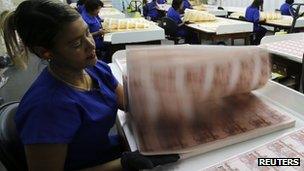Brazil cuts interest rates to fresh record low
- Published

Brazil's central bank has cut its benchmark interest rate to a record low of 7.5% in an attempt to reignite a stalled economic recovery.
The cut, from the previous level of 8%, in the main Selic rate follows recently unveiled government stimulus measures.
The central bank move is the ninth cut in a row since August last year, as the growth rate has fallen dramatically from the 7.5% recorded in 2012.
Now the economy is forecast to grow by less than 2% this year.
The monetary policy committee left the door open for future interest rate reductions, which some analysts expect to happen as early as October.
"If future conditions were to allow for an additional adjustment of monetary conditions, that movement should be conducted with maximum parsimony," the bank said in the statement.
Policymakers face the delicate act of balancing between boosting growth and keeping inflation in check, after it was pushed up by higher global food prices and tax cuts on car sales.
It reversed a downward trend in the 12-month inflation rate that began in September 2011. The annual inflation currently stands at 5.2%, above the central bank target of 4.5%.
Capital Economics analysts said they expected interest rates to remain low for some time as growth would struggle to pick up.
"We think that the consensus expectation for a strong rebound in growth over the next 6-12 months is overly optimistic and remain of the view that rates will stay lower, for longer, than the market currently anticipates," they said in a note.
Stimulus measures
President Dilma Rousseff's government earlier this month announced the first phase of a major economic stimulus package, which would involve a $60bn (£38bn) investment in the country's roads and railways over the next 25 years, with more than half in the next five years.
This includes 8,000km of new roads and 8,000km of railways. Further announcements involving investment in ports and airports are expected in the coming weeks.
Until now the government's previous measures, such as the devaluation of its currency, the real, and progressive reductions in interest rates, have so far failed to stimulate growth.
Brazil has suffered from the global economic slowdown which has crimped demand for its raw materials and commodities.
On Wednesday, Brasilia unveiled new measures aimed at increasing investment and consumption, including an extension of tax breaks on home appliances, furniture and cars.
Finance Minister Guido Mantega said that the economy was showing signs of recovery, but further measures were needed to maintain consumer spending and investment and sustain growth in the second half of the year.
- Published27 August 2012
- Published16 August 2012
- Published15 August 2012